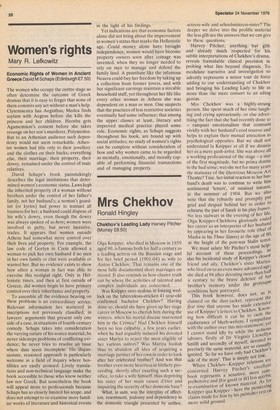Women's rights
Mary R. Lefkowitz
Economic Rights of Women in Ancient Greece David M Schaps (Edinburgh £7.50)
The women who occupy the centre stage so often determine the outcome of Greek dramas that it is easy to forget that none of them commits any act without a man's help. Clytemnestra has Aegisthus, Medea finds asylum with Aegeus before she kills the princess and her children. Hecuba gets Agamemnon's consent before she takes revenge on her son's murderer, Polymestor. But to an Athenian audience such dependency would not seem remarkable. Athenian women had title only to their jewellery. and the clothes on their backs; everything else, their marriage, their property, their dowry, remained under the control of male relatives.
David Schaps's book painstakingly describes the legal institutions that determined women's economic status. Laws kept the inherited property of a woman without brothers under the control of her father's family. not her husband's; a woman's guardian (or kyrios) had power to transact all business for her; a husband could dispose of his wife's dowry, even though the dowry was always spoken of as hers; women were involved in petty, but never lucrative, trades. It appears that women outside Athens had somewhat more control over their lives and property. For example, the law code of Gortyn in Crete allowed woman to pick her own husband if no men in her own family or clan were available or wanted her. But no evidence exists to show how often a woman in fact was able to • exercise this vestigial right. Only in Hellenistic times, and then at first outside of Greece, did women begin to have primary control over their inheritance and property.
To assemble all the evidence bearing on these problems is an extraordinary service. Relevant information lies scattered in inscriptions not previously classified, in lawyers' arguments that present only one side of a case, in situations of fourth-century comedy. Schaps takes into consideration the varying nature of his source material; he never sidesteps problems of conflicting evidence; he never tries to resolve an issue where data seem incomplete. His dispassionate, reasoned approach is particularly welcome in a field of inquiry where hostilities are easily aroused. Lively translations and non-technical language make the book accessible to those who know neither law nor Greek. But nonetheless the book will appeal more to professionals because Schaps has so closely limited his scope, and does not attempt to re-examine more familiar works of literature and historical events in the light of his findings.
Yet indications are that economic factors alone did not bring about the improvement in women's status that marks the Hellenistic age. Could money alone have brought independence, women would have become property owners soon after coinage was invented, when they no longer needed to rely on men to manage and defend the family land. A prostitute like the infamous Neaera could buy her freedom by taking up a collection from former lovers, and with her significant earnings maintain a sizeable household staff, yet throughout her life like every other woman in Athens she was dependent on a man or men. One suspects that the practices of less restrictive societies eventually had some influence; that among the upper classes at least, literacy and improved medical practice played some role. Economic rights, as Schaps suggests throughout his book, are bound up with social attitudes; no study of women's rights can be complete without consideration of how and why women came to be regarded as mentally, emotionally, and morally capable of performing financial transactions and of managing property.


































 Previous page
Previous page